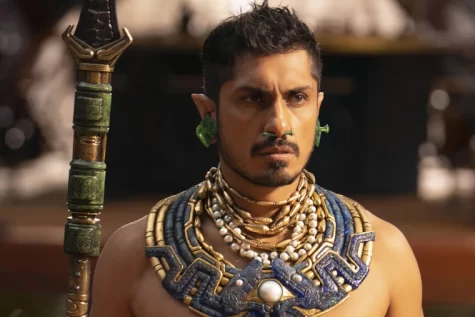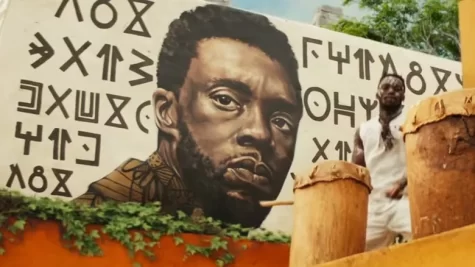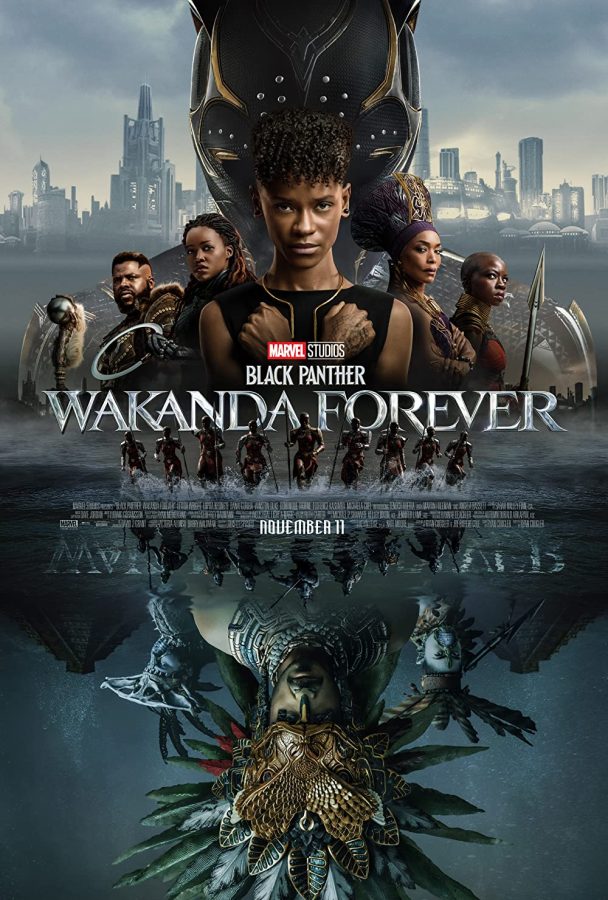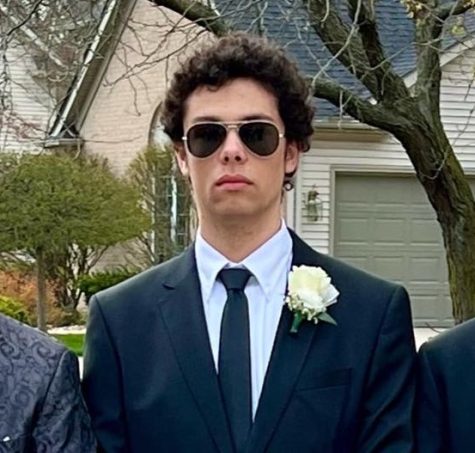Black Panther 2: Marvel’s Best Movie In a Long Time
Marvel’s Black Panther: Wakanda Forever Shows Just How Good a Marvel Movie Can Be
December 2, 2022
(NOTE: This review will contain spoilers. If you have not yet seen the movie, and intend to, please return to this article once you have. Consider yourself warned, Saint Joe!)
A good movie leaves you talking about it on the way out of the theater. The best movies leave you silent, lost in thought. Marvel’s new Black Panther: Wakanda Forever is absolutely one of the latter. While it may not have been quite as good as 2018’s smash hit, it still hits hard in its own right, and deserves to be heralded as one of the best movies in the Marvel catalog.
Where to even begin? Just about everything in this film is stunning. The world building and environment of Wakanda is breathtaking as always, and just as in the first movie, seeing the combination of science fiction and African cultures come together in such an iconic way continues to astound. The new settings of the film are equally as awe-inspiring, with the underwater city of Talokan not only providing some truly amazing visuals (better than some of the recent Marvel fare, shoutout to Thor: Love and Thunder), but also bringing a fantastic representation of Mesoamerican culture to the Marvel Cinematic Universe.
Speaking of which, Namor and his people are a truly compelling antagonist for Wakanda, because at the end of the day, they aren’t doing anything different than the Wakandans did at the beginning of the first movie. Both want the same thing–to protect their home and their precious resource vibranium, and do so through the help of a royal protector, the Black Panther for the Wakandans, and Namor for Talokan. Tenoch Huerta does a magnificent job in the role, and I personally cannot wait to see what shape his character will take next in upcoming films. I will admit, going into this movie, I was quite skeptical of how well Marvel could have brought Namor to the MCU, and how effectively it would have worked in a Black Panther sequel. Yet I was not disappointed–and the two nations’ conflict brings to mind parallels to the conflicts of actual nations as a result of the effects of colonialism. These undertones are prevalent throughout the film, as the movie is as much an allegory for the struggles of black and indigenous communities wrought by European colonialism for resources, as it is a superhero film. Like the first film, Wakanda Forever doesn’t shy away from these topics, instead confronting them in a truly epic way.

Another one of the core themes to the movie is the idea of traditions versus modernity, and I personally loved the debate going on here, especially with how it affected Shuri’s character. With the heart-shaped herb destroyed, there is a clash between Shuri and her mother, now queen, over moving on from Wakandan traditions–including the Black Panther–in favor of technology. It’s a much more compelling debate than the standard “old ways good and new ways bad” fare that tends to come about in a lot of these scenarios, and comes together in a really beautiful way when the ancient herb is recreated with the new technology. I also admittedly had doubts about Shuri becoming the star of the film and the franchise, but her character is just amazingly done, and Letitia Wright does a spectacular job in the role. In fact, all of the characters, from Angela Bassett’s Queen Ramonda to Lupita Nyong’o’s Nakia are just absolutely fantastically written and fantastically acted.
Of course, Wakanda Forever wouldn’t be complete without mentioning the tragic passing of Chadwick Boseman, titular star of the first movie as T’Challa. When it was first announced that the role wouldn’t be recast, I, along with many, were surprised at the decision. But watching this film, particularly in the emotional opening scenes, it was undoubtedly the right decision. Seeing the Wakandans deal with T’Challa’s death in a similar way that many in the real world have dealt with, with a terminal illness taking his life, was absolutely heartbreaking. The funeral scene was one of the most powerful that Marvel has ever done, and to cap it all off, the silent Marvel intro rolling by as a tribute to Boseman gave me chills in the theater, and as I write this a week later. I rarely cry at movies, let alone at Marvel ones–but this was an exception. There will not be a dry eye in the house. Then, seeing all the characters of the film deal with mourning, grief, and loss as they reckon with a new world was absolutely something to behold. It opened up the plot–and Marvel movies in general–to a place that I don’t believe was possible before. Black Panther: Wakanda Forever captured in this sense the true feelings of what it means to be a human, to be mortal, to love and lose someone. To put it simply, you must see this movie.

Outside of a few issues that I think the movie has with pacing (a LOT happens in a relatively quick time), Black Panther:Wakanda Forever is undoubtedly a smash hit that I cannot say enough about. Seriously, this movie has everything–I haven’t even mentioned half of what the film does well. There is so much to think about, ponder, and dwell upon, Ms. Kloser Level 3 Analysis-Style. And of course, the action, heroic moments, and all the other standard Marvel fare don’t disappoint as well. Overall, this is one of the best Marvel movies done in years. If you are into Marvel, go see it. If you’re not, go see it. If you haven’t seen the first Black Panther, watch that first, and then – go see it.


